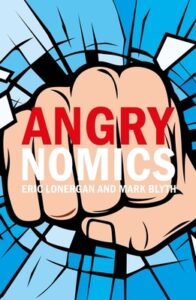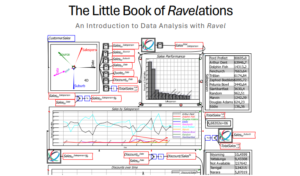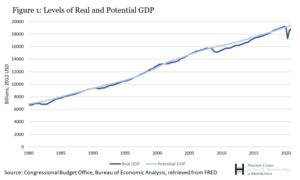This series of blog posts is a summary of what I consider to be the excellent book Angrynomics, by Eric Lonergan and Mark Blyth.
I know of it because I follow Mark Blyth, a professor of International and Public Affairs at Brown University.
Mark Blyth has demonstrated a talent for explaining complex ideas in fairly simple ways.
Additionally, he promotes a perspective that no matter how good a set of economic policy ideas might be, if economic ideas can’t be reduced to something that can be sold within the marketplace of political ideas, they’re never going to become policy.
Because politics is about stories, not truth.
Eric Lonergan is a macro hedge fund manager (whatever that means), economist, and writer.
Another book he wrote that I’ve added to be “to be read” pile is Money, which per a review written by Mark Blyth…
If you like your economic shibboleths stabbed through the heart, roasted and served medium rare with a side of cold hard logic, you should read Eric Lonergan’s Money. You will see not only money, but the whole economic process, in a new light. For anyone who has ever wondered what money actually is and how it works this book is quite simply the place to both start and finish.
In spite of the fact that I am summarizing this excellent book, this series of posts IS a summary.
I strongly recommend you read the book for yourself.
My summary of it will likely be much more poorly written than the book itself is.
In addition, I will go off on the occasional tangent when I feel it’s appropriate to explain an idea more fully or to provide further supporting evidence for an idea.
Table of Contents
The failures of neoliberal economics are making people angry
Neoliberalism is a set of policies, both political and economic, that focus on private ownership of assets, even for services that do not lend themselves to market competition and which directly operate under a government charter of some kind.
Examples of services that do not lend themselves to market competition and which operate under a government charter are roads, highways, rail lines, electrical grids, and services in rural areas which will never be profitable without government support, such as hospitals and internet services.
One of the basic tenants of neoliberalism is what is called “supply-side economics”, more commonly known as “trickle-down economics”.
The main idea here is that when the rich become richer, we all benefit.
Trickle-down doesn’t
Fifty years of tax cuts for the rich have not created the wide prosperity we were promised.
Many American voters on both sides of our political divide agree trickle-down has failed.
Our economic models ignore power: Who has it, and who doesn’t
There is a variant of the golden rule that fits here: They who have the gold make the rules.
In various countries around the world, to different degrees, the big banks and big businesses were “supported” as the 2008 global financial crisis was unfolding.
When the global financial system was at risk of failing, the central banks of the world, following instructions from their governments, rushed to bail out big businesses and big banks.
To my knowledge, the only exception was Iceland, which issued arrest warrants for bankers, let banks fail, and financially support depositors.
By bailing out banks and big businesses, the world’s politicians let everyone publically see who they thought mattered, and by comparison, who they thought didn’t.
Left/right politics don’t fit anymore
There is an excellent Saturday Night Live skit as part of their Black Jeopardy series where Tom Hanks plays a middle-aged white man wearing a MAGA hat who has more in common with the (presumably Democratic) black contestants than anyone would expect.
It illustrates what I think is an important point.
The economic disparity between the 1% and the 99% transcends traditional political divisions.



